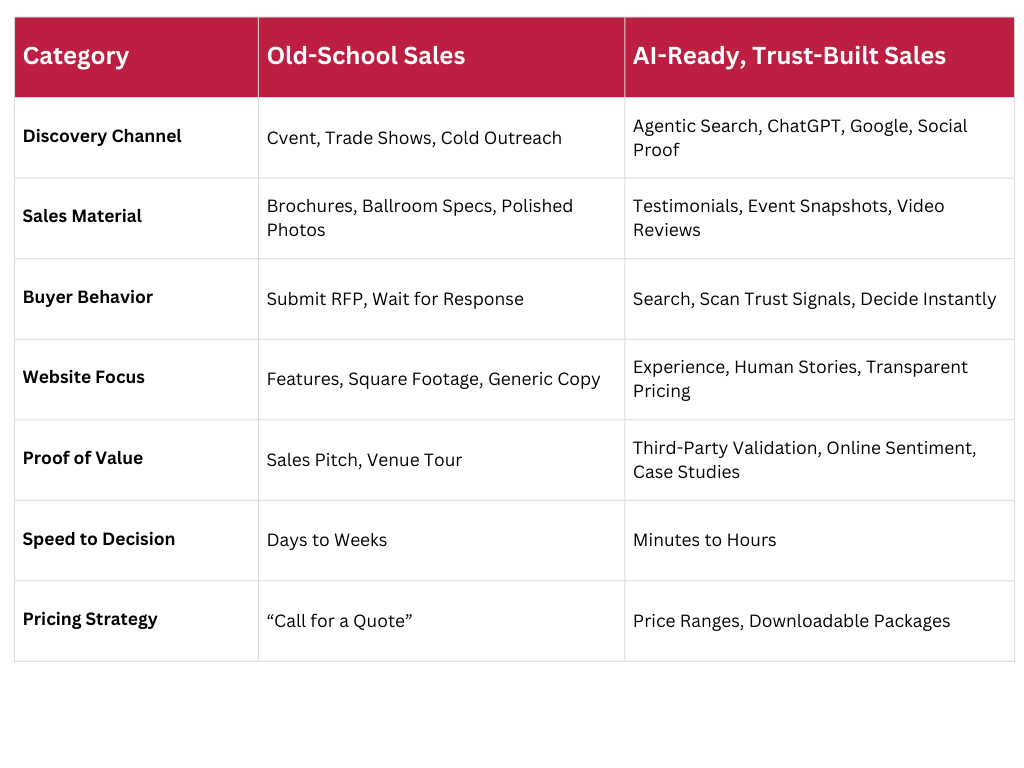
How Agentic Search is Rewarding Human Connection and Punishing Outdated Sales Tactics.
You know what’s wild?
For years, hotel sales folks have leaned hard on polished photos of empty ballrooms and panoramic lobby shots.
And guess what?
It’s not working anymore.
I’m here to tell you: the future of hotel group sales doesn’t look like another chandelier ... it looks like a trust fall into AI.
When Cory Falter and I got together on The InnSync Show, we tackled this head-on: what exactly are “trust signals,” why does AI care so much about them, and why should hotel sellers be scrambling (in a calm, professional way) to get on board?
Spoiler alert: If your strategy is “list on Cvent and hope,” you’re gonna have a bad time.
The Truth About Trust Signals in Hotel Group Sales
Empty Ballrooms and Outdated Playbooks
Every ballroom honestly looks about the same.
Sure, some may have better views or nicer chandeliers, but when you think about it, after you add decor, they all start to blur together unless there’s a story behind the space.
The modern group buyer isn’t just window shopping.
They’re envisioning their experience in your space.
That Pinterest-perfect wedding? That high-impact leadership retreat? They want to feel it. A polished venue pic without a story behind it? That’s just décor without depth.
And here’s the kicker: 63% of planners aren’t even using RFPs anymore. That stat from Cvent was a record-scratch moment for me. They’re skipping the old-school platforms entirely and turning to tools like ChatGPT for answers.
If your property doesn’t show up with content that screams “credible, proven, human,” you might as well be invisible.
When AI Starts Playing Matchmaker
Here’s where it gets spicy.
AI, especially agentic search (yes, it’s a thing), is now the middleman between your hotel and a planner’s “I need this booked by Friday” panic.
When someone types, “Where can I host a 300-person event in Austin with cool team-building options?” into ChatGPT, guess what the AI pulls from? Not your lifeless photos.
It’s looking for trust signals: testimonials, case studies, social proof, transparency, and real stories from real people. If you don’t have it, you don’t show up.
And AI is no dummy. It knows fake. It knows vague. Cory says, “The more I learn about AI, the more it’s asking for more humanity, not less.”
Exactly.
Hotel Group Sales Playbook: Then vs Now

Stop Selling. Start Signaling.
Think about your last big purchase. Did you believe the product page, or did you scroll straight to the reviews? Exactly.
Hotel buyers are no different. They don’t want to be sold to; they want receipts. They want evidence. They want to trust you before they ever fill out a form.
And trust doesn’t come from a polished lobby shot, it comes from signals.
Here’s how to build them:
1. Turn Guests Into Your Sales Team (Sort of)
You probably already have gold sitting in your inbox.
Testimonials from planners. Thank-you emails from wedding couples. Raving reviews from corporate retreats. Don’t let them die in the CRM.
Post them. Feature them. Repurpose them.
- Add written testimonials to your site and event pages.
- Film quick video testimonials at the end of an event (use phones, not film crews).
- Embed real reviews from TripAdvisor, Google, or Yelp.
- Ask past clients if they’ll do a 60-second recap on Instagram or LinkedIn.
If ChatGPT can’t find any of these signals from your brand, neither can your future client.
2. Stop Talking About Square Footage—Tell a Story
You’ve got 5,000 square feet? Cool. So does everyone else.
But did you help a nonprofit host a retreat with custom menus, breakout rooms, and late-night karaoke? That’s what we want to hear.
This is what I call “Event Snapshots.”
Turn successful past events into mini case studies:
- Add photos of the event in action
- Pull quotes from the planners who booked them
- Highlight special touches your team delivered (surprise s’mores bar, anyone?)
Don’t describe your space. Demonstrate the experience.
3. Be Where People Are Talking (and Listening)
Trust signals can come from everywhere:
- Blog mentions of your brand
- Podcast guest spots
- Branded hashtags or tagged posts on social
- User videos and reviews on platforms like TikTok or Instagram
- Upvotes or discussions on Reddit and Quora
- Guest articles, media coverage, or NPS scores
- Wiki references (yes, even that counts)
If it’s authentic and public, it counts as a trust signal. And AI is scraping all of it.
The more your brand is talked about in trusted spaces, the more likely you are to be recommended by both humans and machines.
Make it easy for them to share their story and experience.
4. Kill the Mystery, Show Some Prices!
Let’s talk about the hospitality taboo: pricing.
We get it … there are variables. But hiding behind “Call for a quote” is killing your conversions. People don’t expect exact math, they want a starting point.
Post a range.
Explain what’s included.
Link to a sample package or pricing guide.
Endless Customers author Marcus Sheridan says that buyers have two questions: “How much does it cost?” and “How much will it really cost?” Answer the first one early to earn the chance to answer the second.
Grab Our Trust Signals Checklist (No Opt-In Required!) >>
The Amazon Effect: Patience Is Dead
We’ve all been rewired by instant gratification. Amazon, Netflix, DoorDash… It’s all instant, and now your group buyers expect the same. They’re asking ChatGPT. They’re searching differently. They’re demanding clarity and speed. If your sales process still involves “waiting for someone to get back to you,” you’re not competing, you’re clinging.
That’s why trust signals matter. They speed up the decision-making process by answering the unspoken question: Can I trust you to deliver what I need, without hassle, without risk?
Buyers Are Changing. Are You?
This isn’t just a tech trend for hotel group sales. It’s a human behavior shift. The old model - show the space, wait for RFPs, hope someone picks you - is falling apart. The winners? They’ll be the ones who embrace trust, transparency, and tech… without losing their humanity.
AI is here. But it’s not the enemy. It’s your new sales partner. And it’s asking: can I trust you?
You ready?




